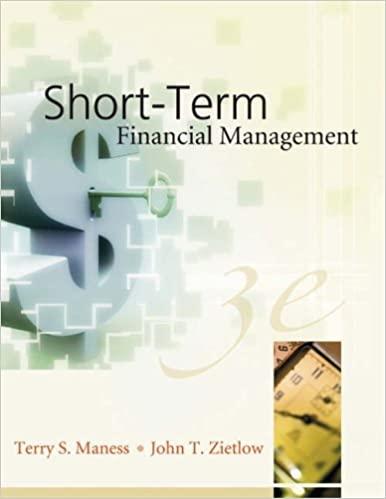Question
Supply Chains and Working Capital Management: Accounts Receivable, Trade Credit and Bank Loans Accounts receivable are funds due from a customer and a firm's credit
Supply Chains and Working Capital Management: Accounts Receivable, Trade Credit and Bank Loans
Accounts receivable are funds due from a customer and a firm's credit policy has a direct impact on the level of receivables held by a firm. The credit policy is a set of rules that consists of four variables: credit period, discounts, credit standards, and collection policy. The credit period is the length of time customers have to pay for purchases; discounts are price reductions given for early payments; credit standards reflect the financial strength of customers that must be exhibited to qualify for credit; and the collection policy is the degree of toughness in enforcing the credit terms. Credit policy is important for three major reasons: (1) It has a major effect on sales. (2) It influences the amount of funds tied up in receivables. (3) It affects bad debt losses. The total amount of accounts receivable outstanding at any given time is determined by the volume of credit sales and the average length of time between sales and collections. This equation can be written as:
Receivables = Average daily sales Days' sales outstanding
Firms generally make purchases from other firms on credit and they record the debt as an account payable. This payable is also known as trade credit, which is defined as the debt arising from credit sales and recorded as an account receivable by the seller and as an account payable by the buyer. Trade credit has a portion that is -Select-costlyfreeItem 1 if the payment occurs during the discount period. If the firm does not take the discount then the trade credit is -Select-costlyfreeItem 2 . The nominal annual cost of trade credit is calculated as:
Bank loans are another important source of short-term financing for businesses and individuals. The costs of these loans vary and can be calculated in a number of different ways. A(n) -Select-compoundingsimpleeffectiveItem 3 interest loan is one where interest only is paid monthly. The -Select-compoundedsimpleeffectiveItem 4 interest rate per day is the nominal interest rate divided by the number of days in the year. The interest charge for the month is calculated as follows:
Monthly interest = Rate per day Amount of loan Days in month
Costly trade credit can be very expensive, so often a firm will choose to borrow from a bank and pay trade discounts rather than paying after the discount period. Firms will choose the lowest-cost source.
Quantitative Problem: Adams Manufacturing Inc. buys $12 million of materials (net of discounts) on terms of 2/10, net 50; and it currently pays after 10 days and takes the discounts. Adams plans to expand, which will require additional financing. If Adams decides to forgo discounts, how much additional credit could it obtain? Round your answer to the nearest cent. Do not round your intermediate calculations. Use 365 day in a year. $
What would be the nominal and effective cost of such a credit? Round your answer to 2 decimal places. Do not round intermediate calculations. Use 365 day in a year. Nominal cost: % Effective cost: %
If the company could receive the funds from a bank at a rate of 8.5%, interest paid monthly, based on a 365-day year, what would be the effective cost of the bank loan? Round your answer to 2 decimal places. Do not round intermediate calculations. %
Should Adams use bank debt or additional trade credit? -Select-The bank loan should be used.Additional trade credit should be used.Item 9
Step by Step Solution
There are 3 Steps involved in it
Step: 1

Get Instant Access to Expert-Tailored Solutions
See step-by-step solutions with expert insights and AI powered tools for academic success
Step: 2

Step: 3

Ace Your Homework with AI
Get the answers you need in no time with our AI-driven, step-by-step assistance
Get Started


